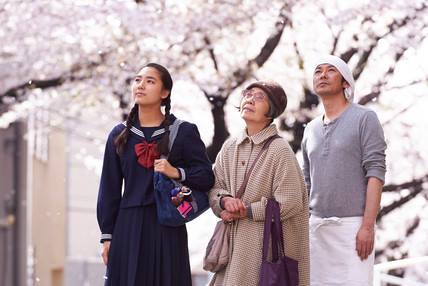‘Sweet Bean,’ From Japan, Is Slow Yet Satisfying

“Sweet Bean” is a new Japanese drama film directed by Naomi Kawase.
March 25, 2016
Naomi Kawase, a regular at the Cannes Film Festival, had her latest film hit theaters last week. “Sweet Bean” — or “An” in Japanese — focuses on a hole-in-the-wall bakery run by a lone man, Sentaro (Masatoshi Nagase). Reclusive and looking to hire, he reluctantly accepts the aid of an old woman named Tokue (Kirin Kiki). As her sweet bean paste makes the shop a commodity, they open up to each other, giving context as to how they both ended up there.
While it’s a slow process, the unraveling of each of the characters is where the film shines. The two leads talk very little, never raise their voices above calm discussion and tend to be characterized more through work than conversation. As a result, both feel wonderfully organic, as their personalities are never defined by dialogue but rather their physical interactions. This helps to create satisfying character revelations.
Tokue’s backstory is treated like a fascinating mystery, as her physical wounds are revealed to be something far more severe. In the other narrative, it is revealed that Sentaro’s life at the bakery might not be by choice. There is also a teenager named Wakana (Kyara Uchida) who, while not as deep as the other two characters, serves as a wonderful bind between the two and has an interesting arc of her own.
The slow, calm nature scenes compliment the tone wonderfully. The film shrugs action or intensity in favor of introspection and meditation. The seamless flow through seasons — revealed through the state of nearby cherry blossoms — gives time a natural, meaningful weight. Showing just a year of life, Kawase beautifully weaves the themes of life, mental tranquility and acceptance through the changing seasons. This is a mood piece in the best of ways.
However, that pacing can also be a flaw. The film’s length, which is a standard two-hour runtime, starts to become heavy at points when little seems to have been accomplished. While there are plenty of discussion heavy films that are even longer than “Sweet Bean,” the exclusive commitment to conversation and cooking makes that length much more apparent. Given that there are no real arguments, no shouting and the music never leaves a swaying mood, the dreaminess can really come back to haunt the film at times. It’s hard to be too critical given how those long pauses are filled with jaw-dropping compositions, but it might be a problem for those expecting something with urgency. Nevertheless, the slow burn leaves room for an intense impact in the film’s final moments.
It’s rare to find a film so committed to its vision as “Sweet Bean.” Mellow, poetic, swooning and calm, Kawase’s work is a lovely and modest film about confronting personal demons and internal struggle. It’s difficult to find such meditative character studies these days, let alone ones that are executed so effectively.
“Sweet Bean” is now playing at Lincoln Plaza Cinemas.
Email Carter Glace at [email protected].























































































































































